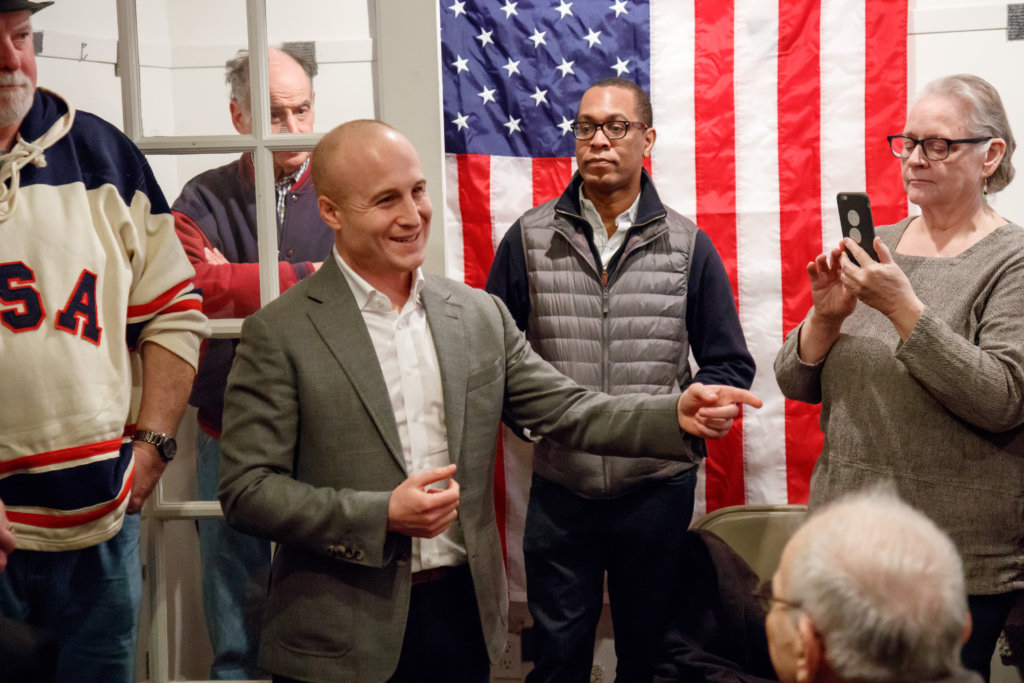BOROUGHWIDE — Democratic U.S. Representative Max Rose sailed into office last year on a blue wave of change and backed by a fervent following of young and passionate volunteers who helped him unseat Republican Congressmember Dan Donovan.
The 33-year-old veteran, who represents the 11th Congressional District, which includes parts of southern Brooklyn and all of Staten Island, served as an active duty officer in Afghanistan from 2012-2013 and earned a Bronze Star, Purple Heart and Combat Infantry Badge.
Rose is Ranger-qualified and continues to serve in the National Guard. He currently serves on the House Committees on Veterans Affairs and Homeland Security, and is chairperson of the Subcommittee on Counterterrorism and Intelligence.
We initially interviewed Rose after his first 100 days in office. With a full year now to reflect on, Rose recently sat down with the Brooklyn Eagle again to answer some questions about his first full year serving in the nation’s capital, what he has accomplished in that time and what he hopes to accomplish going forward.
The following conversation has been lightly edited for clarity and length.
Q: First of all, congratulations on your first full year in office. Is it everything you thought it would be?
Rose: Absolutely! Every day that I get to serve as a member of the United States Congress is a privilege and an incredible blessing. With that being said, I always knew change is hard. If it was easy, it would have already been done. So we didn’t go into this office with any illusions and we’ll continue to fight.
Q: You’ve fought hard to permanently fund the 9/11 Victim Compensation Fund. That must be especially rewarding for you as a decorated veteran.
Rose: We got over 100 co-sponsors to that bill. It’s rewarding in how it’s served my constituents. My district has more recipients of the VCF than any other district in the country. And the stories are remarkable — how they rushed down to Ground Zero when they didn’t have to, stayed there longer than they had to and were aware of some of the potential consequences and still did it. And what’s most remarkable is what each of these individuals say is, ‘I would do it again today,’ knowing what they’ve had to endure since. We should not paint the picture that the Victim’s Compensation fund was inevitable. When this initiative was first announced, Senator Mitch McConnell basically said, ‘I’m not sure that this is a starter.’
People were asking things like, ‘How much does it cost?’ and, ‘If we do this, what do we get?’ It was the incredible advocacy of these 9/11 responders who came down to D.C. with unbelievable people like Jon Stewart and hammered home that the Victim’s Compensation Fund stands for everything that makes this country great. That when you’re there for us, we’re there for you, cost be damned. And we got it done quickly and the President of the United States signed it.
Q: You recently traveled to the Middle East to assess the situation there. What were you able to learn from that trip?
Rose: Right now in the Middle East, in the Strait of Hormuz, is not just the battleground for non-state Jihadist threats like ISIS and Al-Qaeda and so many others, but it is also the nexus by which Iran, China and Russia are starting to engage in unprecedented co-operations. It just makes our activities in the region that much more important. We have an incredible footprint there right now, from Bahrain to Kuwait to Qatar, several thousand soldiers in Iraq, and so forth.
I fully support their efforts to fight ISIS in the region. We’ve seen the consequences of drawing down all of our soldiers there, and then we had to build up the largest coalition since World War II to fight ISIS. We don’t want to engage in that story again. But what we have to consistently resist here is the forces that have pushed the American military to commit to missions that are impossible. We can’t commit to a nation-building mission there. It has to be a security-focused mission. You can’t commit to a mission that seeks to change culture there. We have to be realistic.
I’ve been a critic of the Obama administration in regards to the ways it undertook a very ideological foreign policy in the region that ultimately failed. We have to acknowledge that we have enemies in the region and that some people who have been friends in the past could be friends in the future. America’s security and the security of every nation state have to be our foremost priority.
We can’t act as if we can suddenly turn these nations into western democracies. That would lead to an unnecessary loss of blood. Our first priority has got to be stemming the rise of Jihadist terrorism, and that may very well be a conflict that we fight for the rest of all of our respective lifetimes.
Q: Just to clarify, you did vote in support of the president’s impeachment, which must have been a hard decision knowing that it might upset the Republican voters in your district, but you also were against the measure to limit the president’s power. How do you balance the two?
Rose: Let’s look at the whole landscape here. When I became a member of Congress 13 months ago, it was the second time I swore an oath to the Constitution. And it’s critical that I didn’t swear an oath to politics and so when I made the decision to vote to impeach the president of the United States, I made that off of my oath to the Constitution, not off of a political reading of a district that Donald Trump won by more than he won Texas.
But ironically, six weeks later we’re presented with a question of war and peace. And while the impeachment issue represented the second most serious thing I could ever consider as a member of Congress, questions of war and peace represent the first. But again, my north star remains that I refuse to play politics with these issues of significance. I fully supported the killing of Soleimani. I believed it was legal and justified, and I fully supported the president’s de-escalation after an inevitable Iranian retaliation. That was not the moment to have a politically motivated resolution that is not binding in nature and merely restates existing law. That sends the wrong message to the American people that we are at war with Iran, that we are going to war with Iran, and we weren’t and we aren’t.
Q: You rode in on a progressive wave of Democratic change but you have found a way to work with your colleagues across the aisle. You’ve even called yourself a “centrist populist.” How do you respond to the less moderate “Social Democrat” members of your party who’ve called you out on this?
Rose: First of all, I don’t believe there was a progressive wave that took back the House. What took back the House was leaders who were able to earn people’s trust, talking about things like anti-corruption, infrastructure and healthcare across the country. In essence, what that boils down to is how government can finally work to solve your problems. The message was, let’s turn the page on this era where politics defines everything, and not the urgency to solve people’s problems because they have been suffering and ignored for far too long. That’s what took back the House. And I refuse to allow someone else’s false narrative overtake that.
Q: You’ve chosen to endorse Michael Bloomberg in the 2020 presidential race. Do you think this will help you build additional support among some Republicans who formerly supported him in past Mayoral elections?
Rose: I don’t necessarily know for sure how presidential politics will influence my own electoral chances. I can tell you that I’m going to win this election irrespective of who the Democratic nominee is. I’m going to earn people’s support across the political spectrum because we are putting in the work day in and day out, not 30 days prior to an election when candidates suddenly wake up.
Q: Should she win the Republican primary, you might be facing a formidable challenge for your congressional seat from Assemblymember Nicole Malliotakis. How are you preparing for this campaign?
Rose: I’m not thinking how to beat her. That’s not a concern of mine. What I’m thinking about each and every day is, how do I deliver results? Because that’s the problem with politics. Nicole declared against me six days after I was sworn in because she’s eager to seek elected office. She’s been in a perpetual campaign for the next office for years now. But we cannot let that distract us from actually trying to serve people. I suspect that this will become a campaign about, what have you done? And, what is your vision? I have answers for that. I suspect she doesn’t and that is what is going to define this year.
Q: You’ve prided yourself on focusing on local issues. Please tell us some of the things that you will be working on going forward.
Rose: Well, first of all, the Democratic Party has this tendency to look down upon the local. I haven’t because you can’t separate it from the national or the global. Take the opioid epidemic. We’ve all been to far too many services and memorials. If you don’t look at the global flow of fentanyl, people will continue to die. And so we saw an incredibly local epidemic and engineered a global effort to put sanctions on Chinese pharmaceutical companies that are the primary source of fentanyl.
Take counterterrorism, and what we’ve done to hold social media companies to a standard to get terrorist content off of our platforms. That is a local safety issue but certainly one that requires national and global solutions. But what I also do believe is that if it matters to my constituents, it matters to me, and that goes for the transportation system and so many other things. We’ve fought to bring money home and in my first year, we’ve secured over $10 million for the bus system on 86th Street and a firm commitment from the MTA to prioritize this district in future capital plans. This is significant and we will continue to do this. For my constituents it doesn’t matter if it’s a city or federal issue. It’s just a problem and they want answers and that’s what we’re here for. They need real leaders and that’s also why I’m proud to be sharing an office with (City Councilmember) Justin (Brannan). This is highly innovative that when somebody walks through the door to our office it doesn’t matter if it’s a city or federal issue. We’re here to deal with it in an integrated fashion.
Q: Revisiting a question we asked last time: What has been your biggest pleasant surprise since taking office one year ago?
Rose: Besides my wife not divorcing me (laughs). My team has surpassed any expectation that anyone could have. Everyone has done a phenomenal job and they act as if their names are on the door and take extreme ownership of every single problem and challenge and task placed before them. That’s been extraordinary.

 MTA celebrates 95th Street station’s new elevators
MTA celebrates 95th Street station’s new elevators  Cops arrest man in fatal hit-and-run in Bensonhurst
Cops arrest man in fatal hit-and-run in Bensonhurst